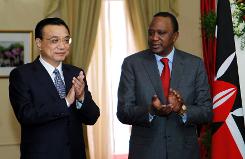China Signs Mega East Africa Rail Deal
AFRICA, 19 May 2014
Agence France-Presse – TRANSCEND Media Service

Chinese Premier Li Keqiang (left) and Kenya’s President Uhuru Kenyatta applaud the signing of the Standard Gauge Railway agreement at the State House in Nairobi on May 11, 2014. afp.com / POOL / Pool
China on Sunday [11 May 2014] signed a deal to build a $3.8 billion rail link between Kenya’s Indian Ocean port of Mombasa and Nairobi, the first stage of a line that will eventually link Uganda, Rwanda, Burundi and South Sudan.
Under the terms of the agreement, Exim Bank of China will provide 90 percent of the cost to replace the crumbling British colonial-era line with a 609.3 kilometre (379 mile) standard-gauge link and Kenya the remaining 10 percent.
Construction is due to start in October and take three-and-a-half years to complete, with China Communications Construction Co. as the main contractor.
Once the Mombasa-Nairobi line is completed, construction would begin to link east Africa’s largest economy with Kampala, Kigali, Bujumbura and Juba.
The deal was signed at State House in Nairobi and witnessed by presidents Uhuru Kenyatta of Kenya, Yoweri Museveni of Uganda, Paul Kagame of Rwanda and Salva Kiir of South Sudan.
“This project demonstrates that there is equal cooperation and mutual benefit between China and the East African countries, and the railway is a very important part of transport infrastructure development,” Chinese Premier Li Keqiang said.
Li has been on a four-country tour of Africa, his first since taking office last year, with the world’s second-biggest economy keen to boost its presence on the continent to find new markets and opportunities.
Kenyatta hailed the booming relationship with China, calling it one “based on mutual trust” and saying Kenya “has found an honourable partner in China”.
Museveni also took a swipe at Western donors who have been critical of his leadership — including government corruption and his recent signing of draconian anti-gay legislation.
“We are happy to see that China is concentrating on the real issues of development,” Museveni said.
“They don’t give lectures on how to run local governments and other issues I don’t want to mention,” he said.
DISCLAIMER: The statements, views and opinions expressed in pieces republished here are solely those of the authors and do not necessarily represent those of TMS. In accordance with title 17 U.S.C. section 107, this material is distributed without profit to those who have expressed a prior interest in receiving the included information for research and educational purposes. TMS has no affiliation whatsoever with the originator of this article nor is TMS endorsed or sponsored by the originator. “GO TO ORIGINAL” links are provided as a convenience to our readers and allow for verification of authenticity. However, as originating pages are often updated by their originating host sites, the versions posted may not match the versions our readers view when clicking the “GO TO ORIGINAL” links. This site contains copyrighted material the use of which has not always been specifically authorized by the copyright owner. We are making such material available in our efforts to advance understanding of environmental, political, human rights, economic, democracy, scientific, and social justice issues, etc. We believe this constitutes a ‘fair use’ of any such copyrighted material as provided for in section 107 of the US Copyright Law. In accordance with Title 17 U.S.C. Section 107, the material on this site is distributed without profit to those who have expressed a prior interest in receiving the included information for research and educational purposes. For more information go to: http://www.law.cornell.edu/uscode/17/107.shtml. If you wish to use copyrighted material from this site for purposes of your own that go beyond ‘fair use’, you must obtain permission from the copyright owner.